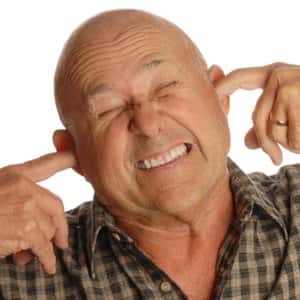
Tinnitus, an annoying and often constant or near-constant sound that nobody else can hear, drives many sufferers crazy. An estimated 30 million people cope with this debilitating and invisible condition. Sometimes damage to the eardrum from excessive noise is the apparent cause of tinnitus. For other individuals, the culprit is prescription medication. Even aspirin and quinine are known to induce tinnitus in some people.
Citalopram (Celexa) and Tinnitus:
Q. I developed tinnitus about 1 year ago. I do not have any type of hearing loss which would have contributed to my ringing in the ears. The only lifestyle event which I can attribute to my tinnitus is the drug citalopram (Celexa), which my doctor prescribed to me for depression.
Since tinnitus is now believed to be in the brain, it would make sense that this drug would be the common denominator. My tinnitus is 24/7. I have been very disappointed with ENT’s [ear nose & throat doctors] and their concern with my tinnitus. I actually received better treatment and information from my neurologist than from my ENT.
My question: has there been a link to drugs, such as citalopram, which have contributed to tinnitus? Also, I have now resorted to eastern medicine, such as acupuncture. Has anyone had positive results?
I am totally desperate for help!
A. This was the first we heard of a link between the antidepressant citalopram (Celexa) and ringing in the ears (tinnitus). We went to the medical literature and could find very little linking antidepressant medications like citalopram and ringing in the ears. In fact, doctors have actually tried treating tinnitus with such medications.
We didn’t give up, though. We did a little more searching and found this side effect buried in the official prescribing information. It was listed as “infrequent.”
So, the drug company lists tinnitus as an uncommon side effect of citalopram. And the medical literature is not very helpful in determining how rare this complication is. You are not the only person to suffer. Here is another report:
I developed screaming high-pitched tinnitus after I had been taking escitalopram (Lexapro) for 10 days. I was given samples by a nurse practitioner (NP) without any drug information or leaflet that the pharmacy usually provides.
I was not taking any other meds at the time. Asked my NP if Lexapro was causing the tinnitus & her reply was “No, she had no other patients that had complained of this side effect.” She told me to keep taking the drug.
I did and the tinnitus increased in volume & eventually was in both ears. I had to become my own advocate and found out from a pharmacist that Lexapro can cause severe, persistent ringing in the ears. I stopped taking Lexapro 19 months ago and I have been suffering with this condition ever since. I tried acupuncture & herbal therapy but it did not help.
Thank you for your post; your situation is exactly like mine. I was given citalopram by my doctor, and then I experienced the exact same results. I feel my tinnitus was caused by this drug. I have also tried acupuncture and other supplements which I have researched. My concern is that doctors and makers of citalopram should be aware of this side effect and look for the root cause.
My ENT dismissed this when I first brought up the relationship between the drug and tinnitus. I would really like to know who we could reach out to and have this link followed up.
It is hard for The People’s Pharmacy to determine if tinnitus is incredibly rare…or a side effect that has been overlooked by the medical community, the drug companies and the FDA. Here is one complication of such drugs that can no longer be ignored:
Citalopram Withdrawal:
I was on citalopram for 10 weeks and came off them cold turkey with some terrible withdrawal symptoms. I am still experiencing some brain shivers and funny sensations, although they are becoming further apart. They are still distressing and leave me exhausted.
Has anyone else had withdrawal symptoms for this period of time, and how long they can last?
The People’s Pharmacy has become a community of people who have also experienced difficult withdrawal symptoms after stopping an antidepressant medication like citalopram or sertraline. We have written about this issue in greater detail here and here.
There is one other side effect associated with many antidepressants that was ignored for years. Now it is recognized as a common complaint, but initially it was dismissed by many prescribers.
Escitalopram (Lexapro) and Sex:
I was on Lexapro (escitalopram) in my early 20s. It worked well but killed my sex drive. Job/life changes and my insurance didn’t cover Lexapro, so I was put on citalopram. It never really helped but it kept me stable and I would notice a change if I missed a dose but still had feelings of sadness and depression.
Now I’m on generic Zoloft (sertraline) because my new insurance doesn’t cover Lexapro. At first, it was great, but now the usual side effects have begun.
ESCITALOPRAM (LEXAPRO) SIDE EFFECTS
- Headache
- Nausea
- Diarrhea
- Constipation
- Indigestion
- Decreased appetite
- Stomach pain
- Dry mouth
- Sweating
- Insomnia
- Fatigue/Tiredness/lethargy
- Dizziness
- Lowered libido
- Ejaculation difficulties
- Impotence
- Lack of orgasm
- Tinnitus (rare)
CITALOPRAM (CELEXA) SIDE EFFECTS
- Dry mouth
- Sweating
- Tremor
- Nausea
- Diarrhea
- Indigestion
- Fatigue/tiredness/lethargy
- Insomnia
- Anxiety/nervousness
- Loss of appetite
- Lowered libido
- Runny nose/cold or flu-like symptoms
- Ejaculation difficulties
- Impotence
- Lack of orgasm
- Tinnitus (rare)
You can learn about the top screw-ups that are made in treating depression in our book, Top Screwups Doctors Make and How to Avoid Them. You can also learn more about other options for treating depression in our guide Dealing With Depression.
Revised 12/15/2016

